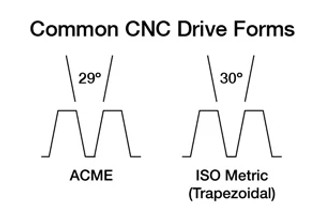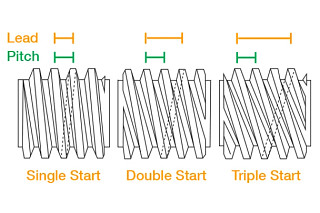Change Language :

Tech Talk: Convert Rotary to Linear Motion
Converting Rotary Motion into Linear Motion with Lead Screw Assemblies
Overview: Tribo-polymer Lead Screw Nuts
Lead screws are a common technology used to convert rotary motion into linear motion, and are often used to provide actuation to a set of linear bearings. Plastic lead screw nuts are an excellent alternative to ball screws in many applications where extreme precision (micron level) is not required. They require no external lubricant, which makes them suitable in applications ranging from sensitive lab instruments to packaging machines. Trapezoidal lead screws are ideal for 3D printers, as the industry is standardized on metric motion profiles and components. They are also very easy to customize, and are found in a number of geometries, from coarse threads for higher torque output, to high-helix designs for higher speed applications.
Traditional materials for lead screw nuts are typically brass, oil-impregnated bronze, and simple plastic materials. igus® tribo-plastics, such as iglide® J and iglide® L280 are composite plastic materials, which offer lower friction and wear values than many other materials across a whole range of applications. These composites operate free of any oil and grease, and do not require maintenance. They are able to operate on traditional ferrous lead screws, as well as low-weight aluminum lead screws.
ACME and Trapezoidal Lead Screws
The single-start ACME thread is the most common form of the lead screw nut in North America. Developed in the mid-1800s, they can be found on all types of machines, and are most suited to low-cycle or positioning applications. Their trapezoidal shape makes them better suited for the axial loading found in power transmission applications.

Standards for single-start ACME nuts apply to the inner thread dimensions. ACME lead screws are called out by their diameter, and then the threads-per-inch (TPI). For example:
A ¾-20 ACME has a major ID of 0.75” and 20 TPI
To calculate the lead (linear travel in inches per one screw revolution) simply divide 1 inch by the TPI. In the above example a 20-TPI nut will travel 0.05” per one revolution.
Trapezoidal lead screws, sometimes referred to as “metric ACME”, are almost identical to ACME lead screw forms, and are more commonplace in Europe and Asia. The major difference from regular ACME is that they are based on metric dimensions, and the angle differs by 1°.
Trapezoidal screws are generally covered by ISO standards for inner and outer geometry. Unlike ACME, they are specified by their major inner-diameter (in mm), and then their pitch (in mm). For example, a trapezoidal 10mm ID screw with a 2mm pitch is called out by: TR 10 x 2
It is important to note that we have been discussing single-start screws. This means that there is one continuous thread on the individual screw. Many manufacturers offer multi-start ACME screws, but the geometries are not necessarily compatible from one manufacturer to another. Multiple-start lead screws benefit from higher load capabilities compared to single-start screws. However, they lose their mechanical advantage, meaning they require higher input torque than single-start screws.
Lead vs. Pitch

Click to enlarge
In single-start geometries, the lead and pitch of a nut are identical. On the other hand, in multi-start leads, the lead is generally greater than the pitch, as shown in the drawing:
Self-Locking and Back-Driving
One important feature of single-start ACME or Trapezoidal systems is that they are not back-drivable. This means they will not convert thrust loads (like gravity) into torque loads. In other words, they will not fall under their own weight; instead, the screw must be turned for the system to move. In many applications, this may eliminate the need for a motor brake, and holding torque requirements on the motor may be reduced in some applications - a major benefit over other types of actuators.
Backlash
Since lead screw nuts glide instead of roll, there is an inherent amount of axial clearance between the screw and the nut. This clearance must be overcome by the screw before its engagement with the nut provides linear motion. This means there is additional tolerance in the rotation of the screw as it translates to linear positioning. Companies such as igus® have developed solutions to remove or reduce this backlash completely.
Zero and Anti-Backlash Lead Screw Nuts
igus® offers zero-backlash nuts for its dryspin® high-helix family of products, as well as anti-backlash nuts for its Trapezoidal (metric ACME) nuts. Zero-backlash assemblies employ two nuts, which are forced apart from each other through the use of a torsion spring. This takes up the axial clearance, providing compensation throughout the lifetime of the system. The anti-backlash nut is designed with a small secondary section in the ID of the nut, which preloads the system, helping to reduce clearance.
High-Helix dryspin® Technology
igus® developed a new high-helix geometry for higher speed applications. While ACME and Trapezoidal lead screw systems are good for positioning high loads, these high-helix threads are better suited for high cycles and speeds, but are also ideal for low load applications. The screws were designed asymmetric to the plastic nuts, optimizing the load carrying areas of the nuts to reduce surface pressure, which in turn increases service life.
DST Steep thread: higher performance in service life and efficiency
dryspin® technology is based on specially for lead screw drives developed wear-resistant igus® high performance polymers. Matching to plastic nut and spindle properties and geometries dryspin® offers longer service life and efficiency for high helix lead screw Threads. By eliminating lubricants, dryspin® lead screws are suitable for applications in pure and hygienic environment (eg in laboratory automation and medical devices).
Typical applications: Laboratory automation, closing units, automotive, & medical equipment.
Load. Speed. Lifetime.
Typical loads for igus® ACME and Trapezoidal threaded nuts are higher than for high-helix, as is represented in the graphs below. Static loads up to 28,900 N (6,502 lbf) are possible with larger diameter screws.
High-helix lead screw systems are capable of loads up to 1,285N (291 lbf).
Reference values when using drylin® plastic nuts without lubrication (with stroke 500 mm). A compensation factor must be used with very short or very long strokes.
Discuss your project with a lead screw assembly expert
Whether you're interested in turnkey, fully assembled solutions or looking to build your own customizable project, let us assist you with a solution based on your specific application and requirements. Contact us via the form below or call us at (800) 521-2747 to discuss your project today!






